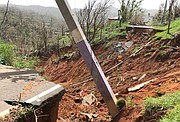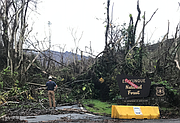Alberton man helps restore communications after Hurricane Maria hits Puerto Rico
When Alberton resident Bryce Nordgren heard about Hurricane Maria he didn’t think he would get a front row seat to the disaster that struck Puerto Rico on September 20. But two weeks later was standing on a highway which had been pummeled by 154 mph winds.
“The storm had flattened the trees and stripped the leaves off,” he said about the Category 4 storm that was the strongest storm to make landfall on the small U.S. island in 85 years. “They were just flattened brown sticks for the most part.”
The trees were on roads and power lines, clogging bridges and water intake systems. Nordgren went with a type III incident team as part of the Forest Service for Region 8. Puerto Rico has the only rain forest in the Forest Service system, El Yunque National Forest.
Nordgren is a physical scientist with the Missoula Fire Service Lab and is also an Amateur Radio Emergency Service Coordinator and Chairman of the Emergency Communications subcommittee of the Mineral County Local Emergency Planning Council. He had put his name into the Red Cross to help with the hurricane emergency efforts as a ham radio operator. When he got word that an incident team was being put together he jumped at the chance to be a part of it.
They arrived soon after the Federal Emergency Management Agency (FEMA). The main things which needed to be done were infrastructure, building roads, and clearing the water intake systems. Nordgren said 20 percent of the potable water comes from the rain forest.
This involved dredging out the intakes to get water back into the communities. Something not easily done is some areas where bulldozers and back hoes could not access. Crews had to walk into the areas and use hand tools. It was estimated that there were 12 dump trucks loads of rock and dirt over some of the intakes.
The incident management team had five members initially and then five more joined them along with 10 law enforcement officers. The number eventually grew to 21 with approximately 60 locals hired to do the work. When they arrived their luggage was full of supplies for the local residents. Items like baby formula, solar panels to charge cell phones, camp stoves, food and water.
Nordgren’s main task was to manage hand held units for communication on the ground and help get satellite communications up for the mainland. The storm left the whole island without power leaving 1.4 million customers of the Puerto Rico Electric Power Authority in the dark.
There weren’t a lot of generators and many of the units ended up needing repairs said Nordgren. With no electricity, traffic signals also weren’t working. Two cops were at every intersection to direct traffic but after 6 p.m. they went home. As a result, after 6 p.m. drivers did not stop because if they did people would come out and steal items from the back of trucks and trailers.
Since cell and internet services were down, Nordgren helped supply and set up communication systems using inreach garmin devices. These are 2-way satellite communicators that allow users to share their location, call for help and even radio the mainland for supplies without cell reception. It was his first time using them and said they worked great in remote areas where cell service isn’t always reliable even under the best of circumstances.
By the time he headed home 21 days later, many of the roads and intake systems had been cleared and communication systems were starting to be restored. However seven weeks later, people are still reporting a lack of electricity, internet and cell service, with food and water in short supply in many places especially in rural areas.







